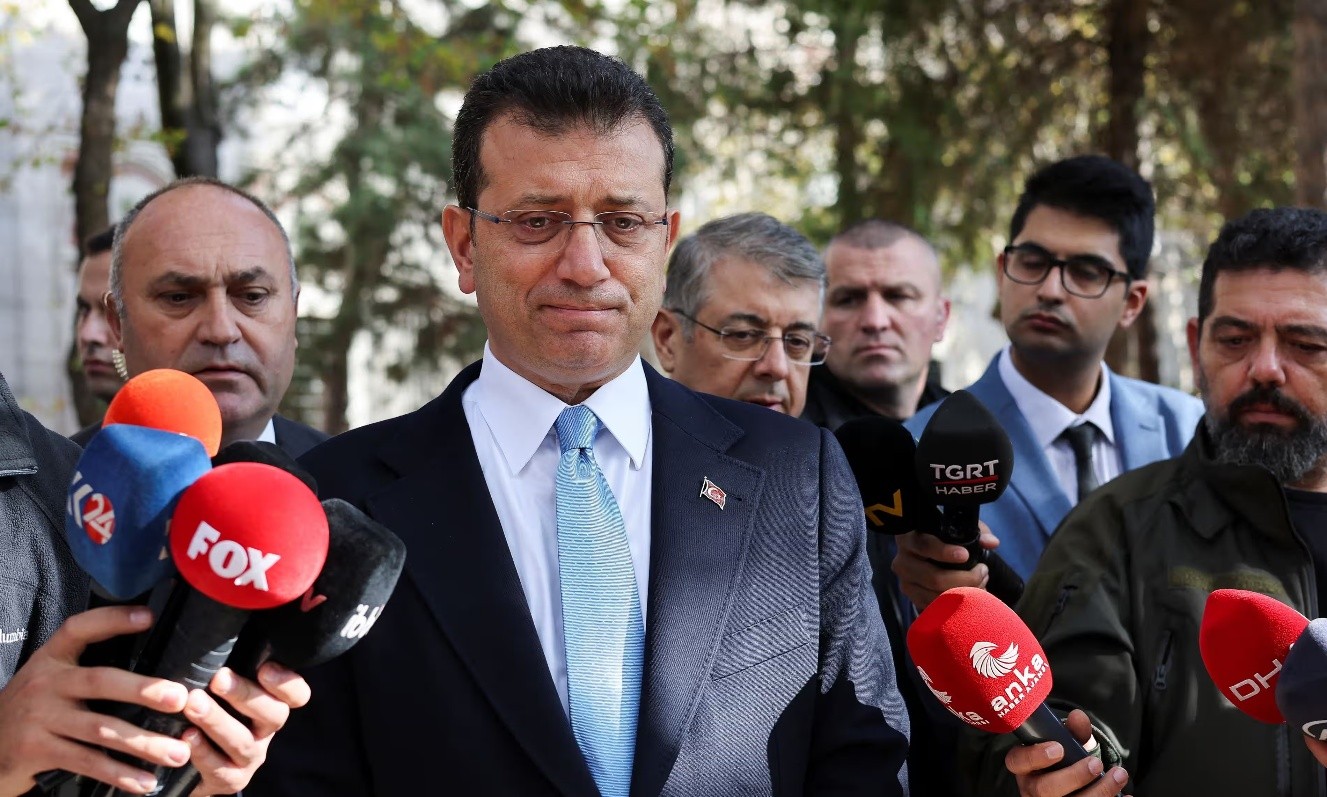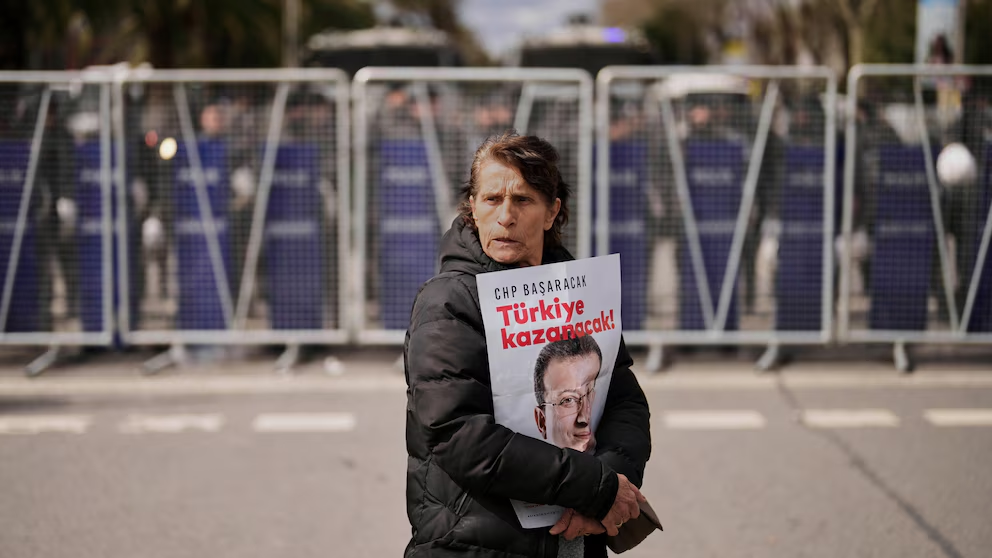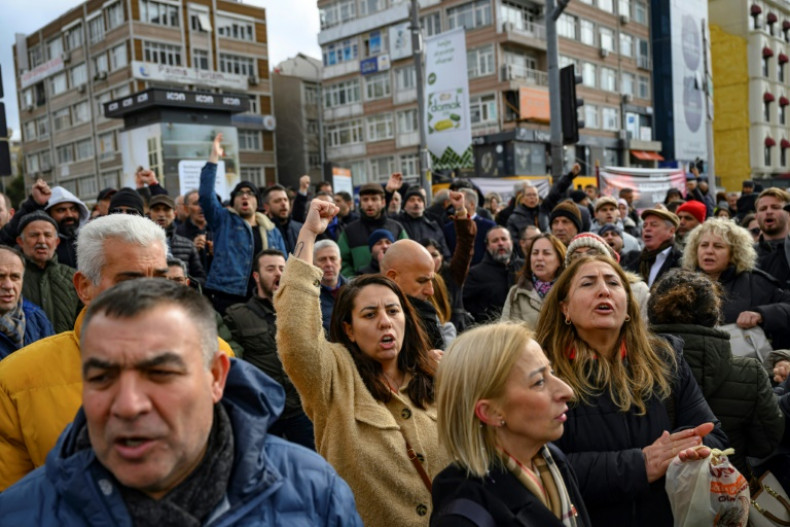By Dimitris Kouvaras,
Mass protests have erupted in Istanbul over the last weeks in reaction to the arrest of Ekrem Imamoglu, leader of the Republican People’s Party (CHP), on March 19th, just days before his scheduled nomination as the party’s candidate for the presidential election of 2028 against Recep Tayyip Erdogan. Imamoglu faced multiple charges, including leading a criminal organisation, bribery and corruption, and is now held at a high-security prison on the outskirts of Istanbul pending trial.
Meanwhile, numerous of his associates have also been detained on similar charges. On the same day as his detention, Imamoglu was endorsed by the CHP as a presidential candidate in an unprecedented open vote that included party non-members and became a display of widespread public support. A whopping 15 million turnout at the ballots defied the legal proceedings against the leader of the opposition, signalling their support but also their disdain for the coercive establishment of Recep Tayyip Erdogan.
What fuelled the arrest? It is easy to acknowledge that it was neither an isolated incident nor coincidental. On the contrary, all legal attacks on Imamoglu serve the purpose of preventing his candidacy against Erdogan and removing him from the stratum of credible politicians. On the day before his arrest, March 18th, his university diploma was annulled by Istanbul University on nebulous grounds, a move that disqualified him from presidential candidacy given the tertiary education requirement of the office. Unequivocally, the timing of this discrediting was no coincidence. Nevertheless, if one looks further back in time, they will stumble upon a striking motif. Already in the lead-up to the 2023 presidential election, Imamoglu faced legal charges of contempt for the judiciary, which hindered his acquisition of the CHP presidential ticket and enabled Erdogan to win over the less popular Kemal Kilicdaroglu. Imamoglu was leading the polls in 2023, while the CHP swept both the latest local elections, winning Turkey’s three major cities of Istanbul, Ankara and Izmir. No wonder Erdogan sought to remove his main opponent out of the way.

However, Imamoglu’s arrest signals a more general pattern in modern Turkish politics, with alarming ramifications. The use of legal means to disqualify or depose members of local administrations unfavourable to the regime has become frequent as an instrument which enables the government to install trustees of its choice in the vacated administrative positions. Therefore, a control mechanism has developed enabling the government to bypass popular will and strengthen its grip over the country through the control of the judiciary and the manipulation of the legal system. This is a consequence of the sweeping powers Erdogan was granted via referendum in 2017, which included intervention in the legal system and weakened the division of power. In the context of the current crackdown on political dissidents, besides Imamoglu those targeted included the leader of the far-right nationalist party Umit Ozdag, who was arrested in January, as well as the remnants of the liberal opposition with the reopening of cases about the 2013 Gezi Park protests.
This pattern of coercion and exploitation of the legal system from Erdogan’s establishment belies a worrying trend with wide-reaching consequences for the political future of Turkey. Up until now, Turkey could be considered a competitive autocracy, which left open the possibility of governmental change through a generally transparent election mechanism resilient to fraud. However, these arrests and their timing show that Erdogan is no longer willing to risk his continuance in office, transgressing the division of powers to achieve the neutralisation of his opponents. Although the election mechanism has not been tampered with directly, this tactic effectively makes sure that popular will is ignored, since popular candidates like Imamoglu are disqualified from the ballots altogether.
What is also most alarming is the passivity of the international community against these violations of democracy, which leaves Erdogan with little international pressure to halt his indirect monopolisation of power. European countries have issued statements condemning the arrests and their threat to democracy, yet these words are not complemented by actions. As Europe finds itself in a volatile geopolitical conjuncture, with the United States unwilling to offer security guarantees and the war in Ukraine still ongoing, Turkey’s geopolitical importance, its role in security operations in the Middle East and its continued ties with Russia provide Erdogan with increased leverage. Combine this with its gate-keeping role concerning refugee steams heading to Europe, and it becomes easy to understand why no more active measures are being taken. On the other side of the Atlantic, the American government predictably turned a blind eye to the jeopardisation of the Turkish democracy, acknowledging the events merely as “internal matters”. After all, President Trump is known for his affinity with authoritarian leaders and has faced accusations of power abuse, so it would be unlikely for him to react as long as strategic cooperation with Turkey remains unaffected.

On the Turkish front, it remains to be seen whether Imamoglu manages to find justice in the courts. No matter what, his indictment has enraged Turkish society and has led to unprecedented displays of political participation and public protest as well as governmental defiance since thousands have ignored the imposed assembly bans and took to the streets. Youth play a major role in these demonstrations. Furthermore, old political grievances are temporarily bridged as Left and Right unite in these anti-institutional acts. The crackdown has led to disillusionment with the establishment and political awakening as its only positive side-effects. Nevertheless, the future of Turkey hangs in the balance. While Imamoglu and the CHP support a secular state following the tradition of Kemal Ataturk, Erdogan leans toward the country’s Islamist tradition.
As these events have not played out completely yet, the future of Turkey remains unsure. However, this surprising coup-like behaviour on the part of Erdogan signals the risks modern democracies face from leaders with authoritarian tendencies. Erosion can happen from within and take years to fully materialise. Such is the case with Turkey, where Erdogan’s lead has lasted for 22 years. What is certain is that without frequent alterations in power, the volatility of democratic states increases and opportunities for power monopolies arise. Let’s hope that, in this case, they can be reversed.
References
- Ekrem Imamoglu and the battle for Turkey’s democratic soul. Ekathimerini. Available here
- The Arrest of Ekrem Imamoglu: A Critical Turning Point in Turkey’s Politics. Arab Center Washington DC. Available here
- Erdogan: Turkey’s all-powerful leader of 20 years. BBC. Available here
- Huge protests as Istanbul mayor jailed on day of likely presidential nomination”. The Guardian. Available here




